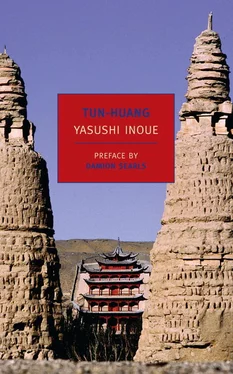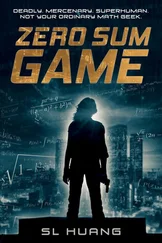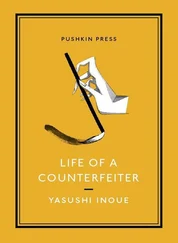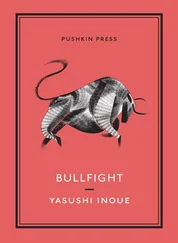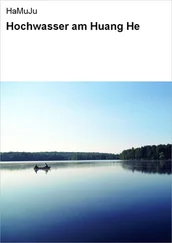The director had shown little interest in Hsi-hsia writing, but Hsing-te could not easily dismiss the mystery of those letters which had come so unexpectedly into his hands. Asleep or awake, he was haunted by the enigma of those symbols.
Hsing-te had no reason to remain any longer in the capital, but somehow he could not bestir himself to prepare for his trip home. He was not depressed because he could not return with glory, nor was he discouraged because of his failure in the examination. The wish to take the examination again was gone; he had a new goal.
The fascination of the strange writing grew in him, and frequently he would pull out the cloth fragment. As he stared at the symbols, he wished that he could somehow read them. From what the woman had told him, he guessed that it was the official document required in Hsi-hsia — either an identification card or a travel permit. The words on it were probably of little significance, but to Hsing-te they seemed to contain some profound, hidden meaning not found in any Chinese classic. Whenever he studied the characters, the sight of the brazen, naked Hsi-hsia woman came to his mind.
Hsing-te decided that he must somehow learn to read those thirty characters, and he was willing to do anything to accomplish this. Until now, passing the civil service examination had been the center of his existence. Now, that dream was gone. In its place was this overwhelming preoccupation with the country of the Hsi-hsia. He wanted to read their writing and to tread their land. He wanted to live among them.
To Hsing-te the Hsi-hsia were a mysterious people. In that northern country there must exist some vital, powerful element, a quality that defied definition. He wanted to go there and experience it for himself. His inherent singlemindedness had been unwittingly transformed by the woman into this obsession with Hsi-hsia, and the course of his life was completely altered. His desire to go there was unsuppressable.
In January of the following year, 1027, Hsing-te reached a walled town near Ling-chou. Nearly half a year had slipped by since he had left K’ai-feng in early summer. The town was a frontier garrison of the Sung army, but until a few years before, it had been a nameless group of twenty or thirty houses. Now it was a bustling walled town, overflowing with troops and newly arrived natives. About twenty miles to the north was Ling-chou, which had once been a frontier base, established during the T’ang period under the regional commander of the north. However, Ling-chou had fallen into Hsi-hsia hands twenty-five years before.
West of the garrison were the Four Commands of the West and the Wu-liang territory, which had originated during the reign of Emperor Wu of the Han dynasty and served as the corridor connecting China with Central Asia. Since the Han era, China had administered these western territories from this frontier garrison. Years before, there had been a regional commander in Liang-chou who controlled this corridor. Later, when the office of Regional Commander of the Mercenaries was created in Sha-chou, the administration was transferred to him. In both cases, this area had been under Chinese domination. Later, there were periods when the Turfans and the Uighurs occupied this land, after which it never again belonged to China. At present, various tribes had gathered together in their own respective groups and formed numerous small kingdoms. The tribe which prided itself most on its strength was the Hsi-hsia, which had its main garrison in Hsing-ch’ing. Besides the Hsi-hsia, there was a tribe of Turfans based in Liang-chou, a tribe of Uighurs with its base in Kan-chou, and a Chinese, or Han, tribe based in westernmost Sha-chou.
Hsing-te could hardly believe that he was still on Chinese soil in this northerly garrison. There were very few Chinese living here, and they were overwhelmingly outnumbered by the various tribes who had formed settlements within the walled city.
On the way to this garrison, Hsing-te had passed through several of the seven fortified towns under its jurisdiction. There were so many foreign faces among the defense troops in each that he felt he was in a foreign land.
During the past six months, Hsing-te had picked up some of the languages of the various tribes. He made the acquaintance of young Chinese who spoke languages of Turkish and Tangut origin, and traveling with them had given him the opportunity of practicing these languages. He was not yet fluent, but he could speak enough of the Uighur, Hsi-hsia, and Turfan languages to get by. But he still had not once seen the writing of the Hsi-hsia. He could not even establish whether or not the Hsi-hsia actually did have characters. The Hsi-hsia who lived in Chinese territory could not be considered true Hsi-hsia. One could not deny that Tangut blood flowed in their veins, but they were not the native Hsi-hsia who had recently formed a new nation and were fast becoming a great power. These Hsi-hsia, living outside of their own country, were only ignorant peasants — the overflow and out-casts of Hsi-hsia who could not be absorbed. They were, in fact, neither Chinese nor Hsi-hsia.
Hsing-te rented a room in a temple in the northeast corner of the walled town and made a living as a scribe, writing reports on the annual tribute and compulsory military service. In spring he planned to journey on to the Wu-liang territory. It snowed for four days in January, six days in February, and three days in March.
Although it was winter, the garrison was still in utter confusion due to the continuous arrivals and departures of troops. The soldiers were a mixture of many different races.
Hsing-ch’ing, the Hsi-hsia base, was about forty miles from here. This was the “Urgai” the Hsi-hsia woman at the marketplace had spoken of. For some years Hsi-hsia troops in Hsing-ch’ing had shown open enmity toward the Chinese army, which also returned the feeling. But Hsi-hsia was busy subjugating the tribes around it and did not want war with China. China, in turn, feared that in case of open conflict with Hsi-hsia, China’s greater enemy, Khitan, might wish to intervene. Despite these fears, the situation was so tense that a large-scale conflict between the two powers appeared imminent.
One early spring day when the sun was beginning to warm the fertile plains surrounding the town, Hsing-te applied to a public official in the garrison for permission to enter Liang-chou. During the winter he had negotiated with different Uighur caravan leaders to take him with them and had secretly decided to enter Liang-chou with one of them. But three days after he had made his application he was notified that permission had been denied.
In Liang-chou there was a small Chinese clan with the surname Chêpu, who were regarded as a race apart from the Turfans. This clan had formed a small nation within the walled city. About five hundred of these Chinese families lived in and around the city, farming the land together with the other tribes. This was in the eastern part of the area called “West of the River,” an important trade route. It was also said that “nowhere in the world are animals as abundant as in Liang-chou.” From ancient times it had been famous for its thoroughbred horses. Because of this, frequent conflicts over control of the area had arisen between the surrounding tribes and the natives. The Hsi-hsia had also continually invaded this land to gain possession of it. In 1015 Hsi-hsia troops overcame the large landowners and held the territory briefly. However, the natives, aided by Uighurs, attacked the Hsi-hsia army, and it was forced to retreat. Despite that setback the Hsi-hsia continued making annual incursions, burning homes and seizing horses. They did not dare remain long, and for a reason — they knew China would certainly attack, since China had the most to lose should Hsi-hsia take over the area.
Читать дальше
